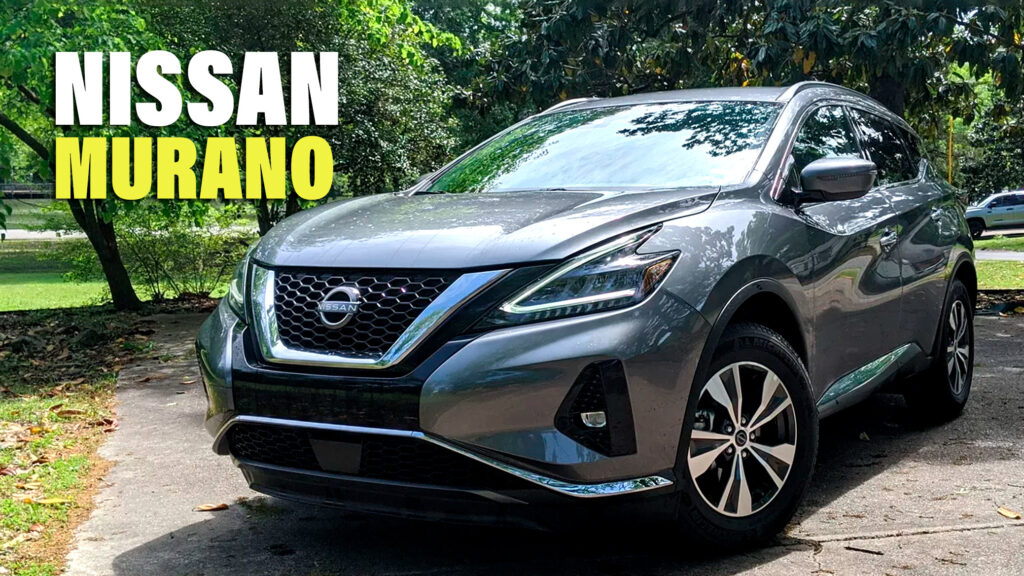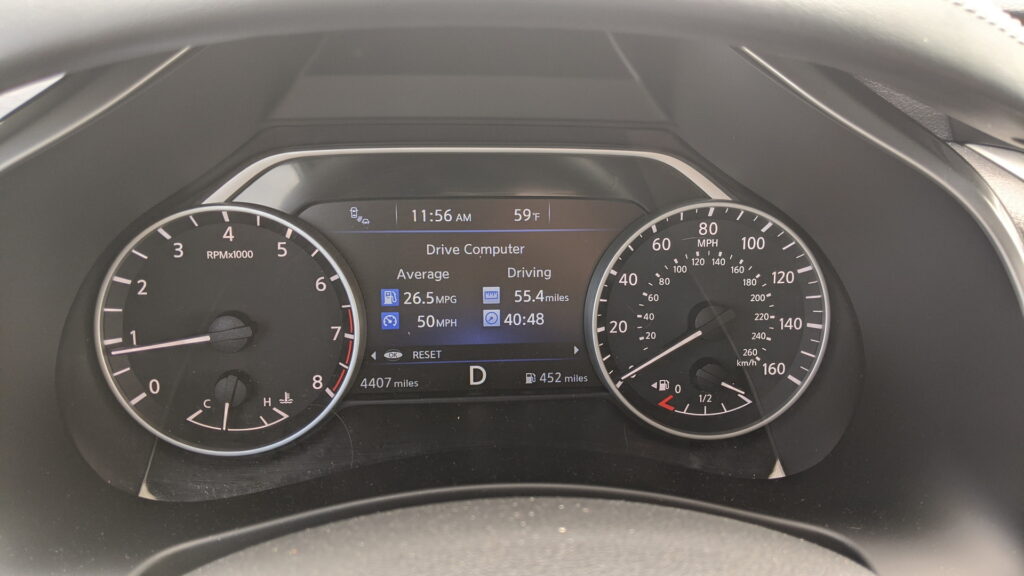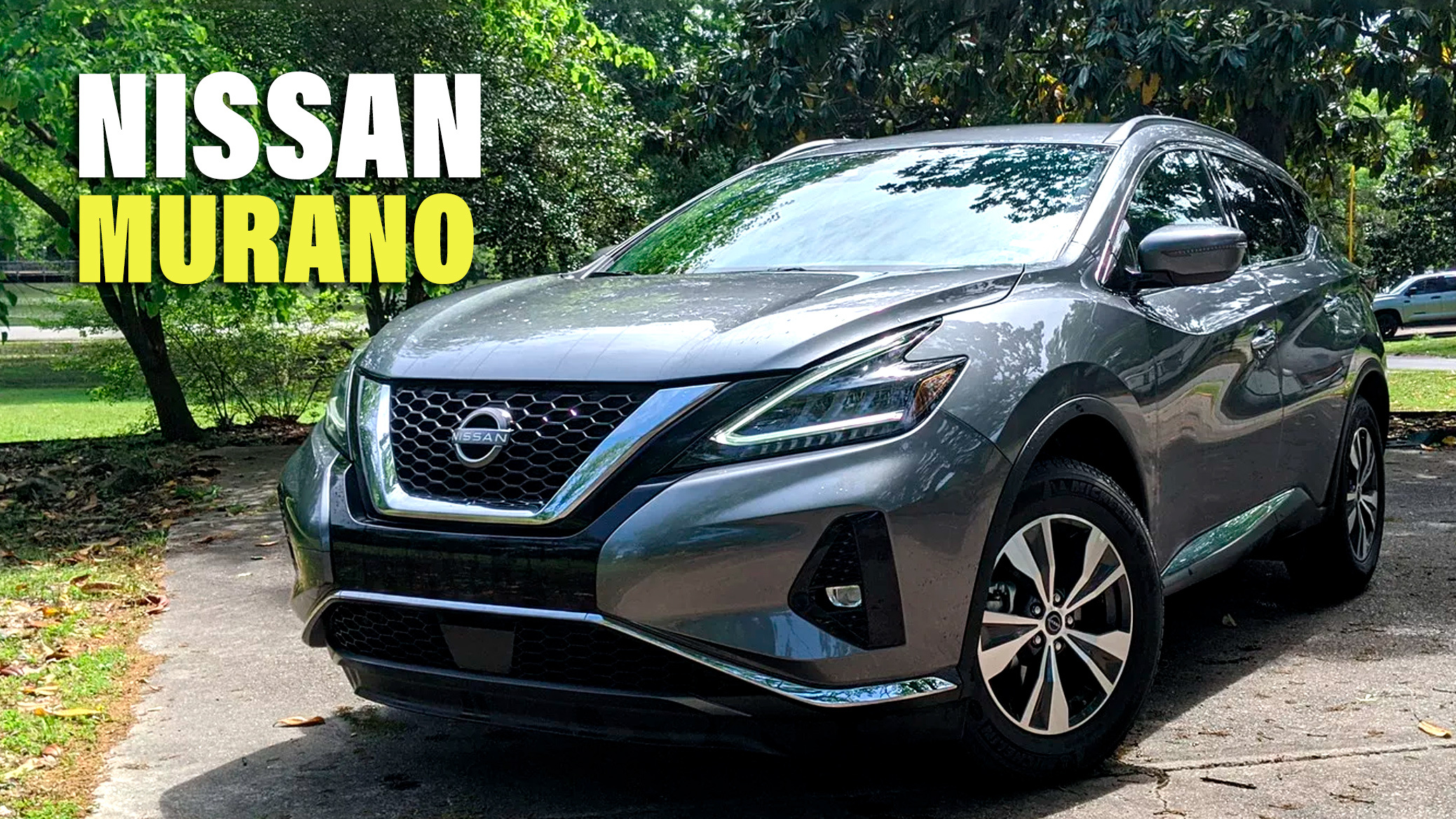Its mix of interior materials, a punchy engine, and driver safety aids continue to make it a soldier for Nissan
May 21, 2023 at 11:59

by Stephen Rivers
Since the introduction of the third generation of the Nissan Murano in 2015, it’s changed very little. Back then, we praised it for its ability to offer so much for so little. The interior looks more luxurious than some rivals and the exterior styling does a good job of helping the Murano stand out from the crowd. Or, at least it did back then. Nissan saw sales of the Murano drop over 34 percent last year compared to 2021.
How does the largely unchanged Murano fare against 2023 rivals and is it worthy of your consideration? To find out, we took one with less than 2,500 miles (~4,000 km) on the clock and nearly doubled its mileage going from Little Rock, Arkansas to Amelia Island off the coast of Florida. Here’s what we learned about the Nissan Murano.
| Quick Facts | |
|---|---|
| › Model: | 2023 Nissan Murano |
| › Starting MSRP: | $35,195 |
| › Dimensions: | 192.8 (4,897mm) L x 75.4 (1,915mm) W x 67.8 (1,722mm) H |
| › Engine: | 3.5-liter V6 |
| › Output: | 260 hp (193 kW) and 240 lb-ft (325 Nm) |
| › Transmission: | Continuously Variable Transmission |
| › Fuel Economy | City 20 – Highway 28 – Combined 23 EPA-EST |
| › On Sale: | Now |
A Face For Murano Enthusiasts
Compared directly with crossovers from 2015, the Murano is quite the zig where others were zagging. Today, it’s still got a handful of unique flourishes that keep it feeling modern. The V-Motion front end, boomerang lights, and floating roof give this SUV an identity all its own. While not very far afield from its 2015 counterpart, the 2023 model does have some exterior upgrades such as the daytime running lights which are now LEDs.
The front fascia is different too with larger plastic cutouts for the fog lights and a division of the body-colored panels on the bumper itself. Honeycomb-shaped plastic surfaces add a bit of texture to what was a previously smoother face. The rear end is even more similar from year to year with the only noticeable update being improved tail lights. One would have to be quite the Murano enthusiast to tell the difference between model years.
Is Anything In The Cabin New?
advertisement scroll to continue
The more things change the more they stay the same and the Murano features an interior that’s very similar to the one from 2015. While most brands would’ve refreshed a vehicle sometime over the course of its eight-year history, Nissan has seen to change very little aesthetically in the cabin. At the same time, that’s not a bad thing entirely. The interior isn’t really lacking in the area most Murano owners likely care about, comfort.
I don’t remember the last SUV I sat in with seats as cushiony or soft as the ones in the Murano. They’re thick, they’re wide, and they’re adjustable enough that at no point over the course of some 2,000 miles did I have a negative thought about them. That same doughy faux leather upholstery is all over the cabin from the armrests to the dash pad and onto the door cards too.
More: What Do You Want To Know About The 2023 Nissan Murano?
On the other end of the spectrum, you’ll find the switchgear which is hard plastic from the window switches to the steering wheel controls to the center control stack. It doesn’t feel great under one’s finger and doesn’t look great to one’s eye. Perhaps though, viewing these pieces through the lens of a journalist that tests cars all year isn’t the way to go.
Consider the average Murano buyer a bit more and this interior makes more sense. The buttons, knobs, and switches don’t feel great but they work perfectly. There’s a very clear indication that what you attempted to do worked and almost every piece of switchgear is laid out simply and symmetrically with the rest of the interface. That feels like a good example of unapologetically aiming squarely at a demographic.
The infotainment system is similarly a mixed bag. It consists of an 8-inch touchscreen with both Android and Apple compatibility. The touchscreen itself works well and responds quickly but we’d like to see the user interface updated as it looks outdated and isn’t very intuitive to use. That said, it connected flawlessly to bluetooth throughout the trip and provided good clear sound quality too.
Where many bemoan the Murano is in the cargo department. It’s true that some rivals feature three rows or considerably more storage in the trunk. Our tester didn’t even have a tow hitch for us to add a bike rack or other cargo-carrying device. Nevertheless, we managed to, for a short time, fit four people inside with all of their luggage and two road bikes. That’s not bad for a vehicle with a claimed 32.1 cubic feet of capacity.
Driving A Sofa
Piloting the Murano almost feels like wearing two pairs of socks and not in the “I don’t have enough space in here” sort of way. It’s warm and it’s comfortable, but at the same time, your connection to the outside world is damped. The good side of that is that it’s very smooth even on less-than-ideal road conditions.
It feels stable and while some might complain about a lack of visibility due to the way the C-Pillar is shaped, we’d just say that blind spots are all but gone when one uses their mirrors correctly. Conversely, feedback through the steering wheel and pedals isn’t anywhere near as sharp as some of us might like but again, the Murano isn’t trying to be a sharp pseudo-sports car in an SUV package.
The insulation isn’t all bad either. It benefits the Murano by keeping road, tire, and engine noise mostly outside of the cabin. The only fly in that ointment is the all-too-well-known drone from the 3.5-liter V6 up front when you mash the go pedal. The motor itself is actually pretty good, developing a factory-rated 260 hp (193 kW) and 240 lb-ft (325 Nm) of torque but the Murano falters a bit due to its use of a continuously variable transmission that causes significant engine drone when accelerating hard.
Read: The Nissan Fairlady X Is The Unholy Union Of A New Z And A Murano
It’s worth noting too that since this powertrain is so old, the Murano isn’t really up to date with rivals in terms of fuel economy standards. According to the EPA, it’ll get at best 20 mpg in the city and 28 on the highway. We came away with an average of 26.5 mpg over a total of 2,074 miles (3,337 km). That’s not bad compared to other V6-equipped competitors but those that use four-cylinder engines or hybrid drivetrains fare better.

The Murano has seen significant updates to safety tech over the years though. Our mid-tier SV trim came standard with adaptive cruise control, which, if you let it work, is a godsend on a long road trip in a car that seems to be constantly trying to lull you into sleep. Every Murano now comes with blind-spot warning, forward collision mitigation, lane-departure mitigation, and rear parking sensors. Those are great features to have and it’s nice to see that Nissan has prioritized them.
How The Murano Measures Up
In that original 2015 review, we said that the Murano doesn’t pretend to do anything it can’t. That’s as true today as it’s ever been. For now, good enough seems to be working for Nissan as sales were actually up year over year during the fourth quarter of 2022. They’re up again after the first quarter of 2023. Of course, other rivals have figured out that same game plan to a degree.
The Hyundai Palisade, Kia Telluride, and Honda Passport all achieve similar goals albeit with a few more aspirations of off-road capability. The Murano doesn’t need to be that but hopefully, whenever the next generation arrives, it can do something that this one never did: lead the pack. Pushing the bar higher than “just good enough” is something that benefits all of us.

buy stromectol online – tegretol 200mg tablet cheap tegretol 200mg
generic accutane 40mg – order linezolid 600 mg pill zyvox order
cost amoxil – amoxicillin drug combivent cost
cheap prednisolone 40mg – generic progesterone 100mg order progesterone 100mg generic
order neurontin 100mg pill – buy generic neurontin 800mg itraconazole tablet
amoxiclav canada – ketoconazole order buy duloxetine without a prescription
vibra-tabs online buy – order albuterol pill order glucotrol 5mg online
buy rybelsus no prescription – cyproheptadine 4mg price buy periactin
order tizanidine without prescription – buy hydroxychloroquine 200mg pills microzide brand
cialis 5mg – sildenafil online buy usa viagra overnight
buy viagra pill – cialis 5mg for sale female cialis tadalafil
atorvastatin 20mg us – order prinivil pill purchase lisinopril pill
buy cenforce online – glycomet 500mg usa order glucophage 1000mg
cheap prilosec – order generic omeprazole 20mg tenormin 100mg uk
desloratadine order – priligy medication buy priligy 30mg online cheap
cytotec cheap – buy diltiazem sale buy generic diltiazem over the counter
buy motilium – oral flexeril buy flexeril 15mg generic
buy domperidone 10mg online cheap – buy generic tetracycline for sale purchase cyclobenzaprine online cheap
purchase inderal pill – order plavix 150mg for sale cheap methotrexate 2.5mg
warfarin 5mg without prescription – metoclopramide 10mg pill buy losartan online
buy levofloxacin paypal – order levofloxacin pill buy zantac 150mg pills
buy mobic 7.5mg – celecoxib 200mg cost order tamsulosin 0.2mg